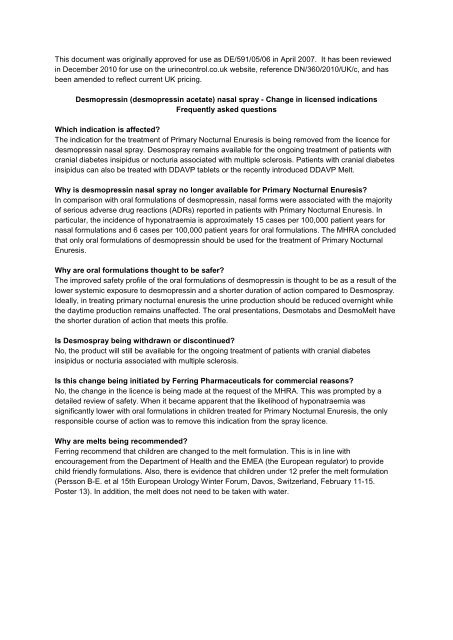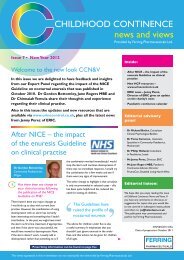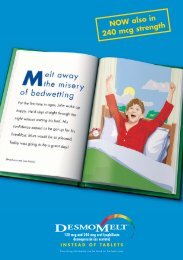Frequently Asked Questions - UrineControl.co.uk
Frequently Asked Questions - UrineControl.co.uk
Frequently Asked Questions - UrineControl.co.uk
You also want an ePaper? Increase the reach of your titles
YUMPU automatically turns print PDFs into web optimized ePapers that Google loves.
This document was originally approved for use as DE/591/05/06 in April 2007. It has been reviewed<br />
in December 2010 for use on the urine<strong>co</strong>ntrol.<strong>co</strong>.<strong>uk</strong> website, reference DN/360/2010/UK/c, and has<br />
been amended to reflect current UK pricing.<br />
Desmopressin (desmopressin acetate) nasal spray - Change in licensed indications<br />
<strong>Frequently</strong> asked questions<br />
Which indication is affected?<br />
The indication for the treatment of Primary Nocturnal Enuresis is being removed from the licence for<br />
desmopressin nasal spray. Desmospray remains available for the ongoing treatment of patients with<br />
cranial diabetes insipidus or nocturia associated with multiple sclerosis. Patients with cranial diabetes<br />
insipidus can also be treated with DDAVP tablets or the recently introduced DDAVP Melt.<br />
Why is desmopressin nasal spray no longer available for Primary Nocturnal Enuresis?<br />
In <strong>co</strong>mparison with oral formulations of desmopressin, nasal forms were associated with the majority<br />
of serious adverse drug reactions (ADRs) reported in patients with Primary Nocturnal Enuresis. In<br />
particular, the incidence of hyponatraemia is approximately 15 cases per 100,000 patient years for<br />
nasal formulations and 6 cases per 100,000 patient years for oral formulations. The MHRA <strong>co</strong>ncluded<br />
that only oral formulations of desmopressin should be used for the treatment of Primary Nocturnal<br />
Enuresis.<br />
Why are oral formulations thought to be safer?<br />
The improved safety profile of the oral formulations of desmopressin is thought to be as a result of the<br />
lower systemic exposure to desmopressin and a shorter duration of action <strong>co</strong>mpared to Desmospray.<br />
Ideally, in treating primary nocturnal enuresis the urine production should be reduced overnight while<br />
the daytime production remains unaffected. The oral presentations, Desmotabs and DesmoMelt have<br />
the shorter duration of action that meets this profile.<br />
Is Desmospray being withdrawn or dis<strong>co</strong>ntinued?<br />
No, the product will still be available for the ongoing treatment of patients with cranial diabetes<br />
insipidus or nocturia associated with multiple sclerosis.<br />
Is this change being initiated by Ferring Pharmaceuticals for <strong>co</strong>mmercial reasons?<br />
No, the change in the licence is being made at the request of the MHRA. This was prompted by a<br />
detailed review of safety. When it became apparent that the likelihood of hyponatraemia was<br />
significantly lower with oral formulations in children treated for Primary Nocturnal Enuresis, the only<br />
responsible <strong>co</strong>urse of action was to remove this indication from the spray licence.<br />
Why are melts being re<strong>co</strong>mmended?<br />
Ferring re<strong>co</strong>mmend that children are changed to the melt formulation. This is in line with<br />
en<strong>co</strong>uragement from the Department of Health and the EMEA (the European regulator) to provide<br />
child friendly formulations. Also, there is evidence that children under 12 prefer the melt formulation<br />
(Persson B-E. et al 15th European Urology Winter Forum, Davos, Switzerland, February 11-15.<br />
Poster 13). In addition, the melt does not need to be taken with water.
What are the current patterns of usage of desmopressin spray?<br />
Enuresis Clinics see a significant proportion of enuresis patients. Many of these specialist clinics have<br />
already moved away from using spray to oral formulations as first line therapy, for a variety of<br />
reasons. Currently we believe the majority of prescriptions for desmopressin spray are generated in<br />
General Practice.<br />
Is DesmoMelt the only preparation that will be available for Primary Nocturnal Enuresis?<br />
No Desmotabs remain available for this indication.<br />
Is there a financial implication to the change?<br />
Yes, a very small one.<br />
Desmomelt 30 x 120micrograms £30.34 (Basic NHS Price)<br />
Desmomelt 30 x 240 micrograms £60.68 (Basic NHS Price)<br />
Desmospray 6ml £25.02 (Basic NHS Price)<br />
Desmopressin tablets 30 x 200micrograms £33.82 (Drug Tariff price, accessed 11/11/10)<br />
Are there patent expiry issues with this switch?<br />
No. DesmoMelt was introduced as a child friendly form of Desmopressin in response to widespread<br />
re<strong>co</strong>mmendations from regulatory authorities including the DoH and EMEA, for more medicines to be<br />
specially formulated for children. The patent for Desmospray expired in 1998 and Desmotabs in early<br />
2005. There have been several sprays and tablets introduced since patent expiry.<br />
Why are DesmoMelts being re<strong>co</strong>mmended as first choice and not Desmotabs?<br />
DesmoMelts is a formulation developed specifically with children in mind to be easy to take.<br />
Desmotabs are also available for patients who prefer to take an ordinary tablet.<br />
When should patients change?<br />
There is no immediate urgency. It is re<strong>co</strong>mmended that patients can <strong>co</strong>mplete their current <strong>co</strong>urse of<br />
treatment with desmopressin spray. They should be reviewed and transferred to DesmoMelt or<br />
Desmotabs at their next routine review.<br />
What needs to be done during the review?<br />
Confirm the patient still requires desmopressin for their bedwetting.<br />
The patient should be advised to dis<strong>co</strong>ntinue the spray and start the next evening on DesmoMelt or<br />
Desmotabs.<br />
DesmoMelt should be taken at night before sleep and is placed under the tongue. The initial dosage<br />
is 1 x 120mcg DesmoMelt. This can be increased to 1 x 240mcg or 2 x 120mcg Melts if the response<br />
is not sufficient.<br />
Desmotabs should be taken at night before sleep with a small amount of water. The initial dosage is<br />
1 x 0.2mg Desmotabs. This can be increased to 2 x 0.2mg Desmotabs if the response is not<br />
sufficient.<br />
DesmoMelt or Desmotabs should be taken at night before sleep. Advise the patient on fluid intake.<br />
Fluid must be limited to a minimum from one hour before until 8 hours after taking DesmoMelt. The<br />
patient should be advised if they experience an unusually bad or prolonged headache they should<br />
<strong>co</strong>ntact the doctor.
Further information is available on request from Ferring Pharmaceuticals Limited Medical Information<br />
Department on 01753 214848 or email: medical@ferring.<strong>co</strong>m and at<br />
http://www.urine<strong>co</strong>ntrol.<strong>co</strong>.<strong>uk</strong>/news.php





